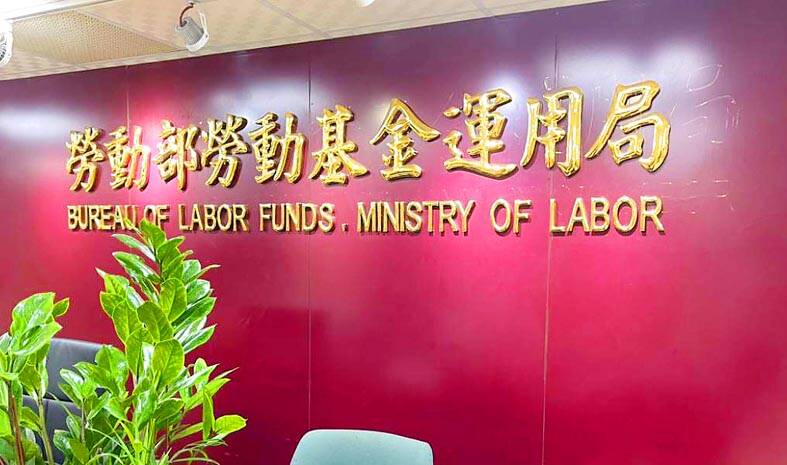One of Taiwan’s largest pension funds has guided outside firms against using Hong Kong-registered entities to manage its money, people familiar with the matter said, underscoring the geopolitical challenges facing the financial hub as it deepens ties with China.
The Bureau of Labor Funds, which manages about US$235.2 billion, has been verbally asking third-party managers to exclude Hong Kong entities from its contracts since last year, the people said, asking not to be identified because the information is private.
The bureau regularly gives out mandates to global asset managers to invest in equities and fixed income. While it has cautioned against investing in China due to economic concerns and financial risks, its stance toward Hong Kong units of global firms was not publicly known.

Photo: Lee Chin-hui, Taipei Times
Hon Kong was named a “sensitive jurisdiction” by the bureau when it selected fund managers for a US$1.6 billion mandate to invest in sustainable real estate securities in September last year, the people added.
Asset managers have different practices for assigning outside mandates. Some are based on the firm’s head office, while others are determined by where the portfolio managers sit. The bureau awards contracts based on a number of factors, including the quality of operations and fees.
The bureau gave a mandate to a Hong Kong entity run by a global manager as recently as two years ago. Northern Trust Company of Hong Kong Ltd won a mandate for global passive equity in September 2023.
The shift comes as Hong Kong becomes increasingly intertwined with China, despite Beijing’s “one country, two systems” setup. Following the imposition of Hong Kong’s National Security Law about five years ago, the US suspended the territory’s preferential trade status.
In April, President William Lai (賴清德), also chairman of the ruling Democratic Progressive Party, required members to report trips to China including Hong Kong and Macau. The following month, the legislature also discussed “enhanced management” of civil servants’ visits to the regions.
Hong Kong invoked national security laws in June to ban a Taiwanese-made mobile game for the first time. Hong Kong police said the game advocated armed revolution and overthrowing the government in Beijing.
The bureau in August last year said that its self-managed portfolio had no direct investments in China or Russia, while its outsourced portfolio investing offshore still had exposure to the regions from the indices used by asset managers as performance benchmarks.
The bureau manages pension funds from compulsory contributions from employers to employees in the jurisdiction. Its China investments stood at about US$1.58 billion, or 0.8 percent of total exposure, as of the end of 2023.
Regarding the Bloomberg report, the bureau yesterday said that in light of the recent rise in international geopolitical risks, its tender documents include a general reminder for global asset managers to enhance investment stability, which is not targeted at any specific region or single case.
Even when it gave a mandate to a Hong Kong entity for global passive equity in 2023, it did not require the selected asset manager to change the entity, the bureau added.
Additional reporting by staff writer

RECYCLE: Taiwan would aid manufacturers in refining rare earths from discarded appliances, which would fit the nation’s circular economy goals, minister Kung said Taiwan would work with the US and Japan on a proposed cooperation initiative in response to Beijing’s newly announced rare earth export curbs, Minister of Economic Affairs Kung Ming-hsin (龔明鑫) said yesterday. China last week announced new restrictions requiring companies to obtain export licenses if their products contain more than 0.1 percent of Chinese-origin rare earths by value. US Secretary of the Treasury Scott Bessent on Wednesday responded by saying that Beijing was “unreliable” in its rare earths exports, adding that the US would “neither be commanded, nor controlled” by China, several media outlets reported. Japanese Minister of Finance Katsunobu Kato yesterday also

Taiwan’s rapidly aging population is fueling a sharp increase in homes occupied solely by elderly people, a trend that is reshaping the nation’s housing market and social fabric, real-estate brokers said yesterday. About 850,000 residences were occupied by elderly people in the first quarter, including 655,000 that housed only one resident, the Ministry of the Interior said. The figures have nearly doubled from a decade earlier, Great Home Realty Co (大家房屋) said, as people aged 65 and older now make up 20.8 percent of the population. “The so-called silver tsunami represents more than just a demographic shift — it could fundamentally redefine the

China Airlines Ltd (CAL, 中華航空) said it expects peak season effects in the fourth quarter to continue to boost demand for passenger flights and cargo services, after reporting its second-highest-ever September sales on Monday. The carrier said it posted NT$15.88 billion (US$517 million) in consolidated sales last month, trailing only September last year’s NT$16.01 billion. Last month, CAL generated NT$8.77 billion from its passenger flights and NT$5.37 billion from cargo services, it said. In the first nine months of this year, the carrier posted NT$154.93 billion in cumulative sales, up 2.62 percent from a year earlier, marking the second-highest level for the January-September

‘DRAMATIC AND POSITIVE’: AI growth would be better than it previously forecast and would stay robust even if the Chinese market became inaccessible for customers, it said Taiwan Semiconductor Manufacturing Co (TSMC, 台積電) yesterday raised its full-year revenue growth outlook after posting record profit for last quarter, despite growing market concern about an artificial intelligence (AI) bubble. The company said it expects revenue to expand about 35 percent year-on-year, driven mainly by faster-than-expected demand for leading-edge chips for AI applications. The world’s biggest contract chipmaker in July projected that revenue this year would expand about 30 percent in US dollar terms. The company also slightly hiked its capital expenditure for this year to US$40 billion to US$42 billion, compared with US$38 billion to US$42 billion it set previously. “AI demand actually